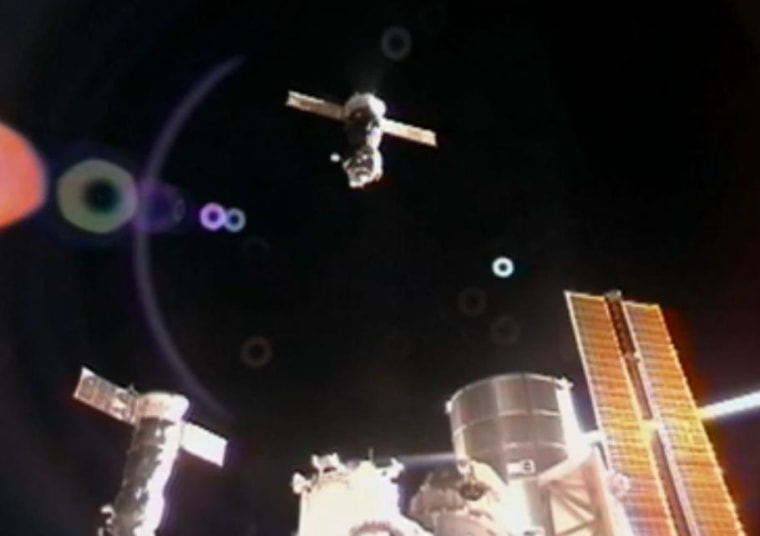Three spacefliers have arrived at the International Space Station, their new home for the next five and a half months.
NASA astronaut Mike Fossum, Japanese astronaut Satoshi Furukawa and Russian cosmonaut Sergei Volkov reached the orbiting lab Thursday after a two-day journey. Their Soyuz capsule docked to the Rassvet mini research module in the station's Russian segment a few minutes ahead of schedule at 5:18 p.m. ET.
During Wednesday's preparations for the spacecraft's rendezvous with the station, a slight issue was detected with one of the Soyuz thrusters. Russian flight controllers determined, however, that it would not impact the capsule's docking operations.
The arrival of the new crew members brings the population of the space station back up to six people. NASA astronaut Ron Garan and Russian cosmonauts Alexander Samokutyaev and Andrey Borisenko have been living and working on the orbiting outpost since April 6.
Garan, Samokutyaev and Borisenko, the station's commander, were on hand to welcome the new residents in a traditional ceremony after the opening of the hatches between the two spacecraft. The six spacefliers now make up the station's Expedition 28 crew.
Fossum, Volkov and Furukawa launched into orbit from the Baikonur Cosmodrome in Kazakhstan on Tuesday aboard the Russian-made Soyuz TMA-02 spacecraft.
The new crew members will live and work at the space station for roughly five and a half months. During their stay, they will be involved in a variety of scientific experiments and research, ranging from life sciences to Earth observation.
The astronauts will also perform routine maintenance and upgrades to the station's infrastructure as needed.
Additionally, the Expedition 28 crew will play host to the space shuttle Atlantis and its four astronauts next month. Atlantis is currently scheduled to embark on its last mission — the final mission of NASA's space shuttle program — on July 8.
Atlantis' STS-135 flight will deliver critical supplies to the International Space Station to help prepare the complex for the years following the retirement of the shuttle program. When NASA stops flying the shuttle, the agency will no longer be able to take advantage of the enormous cargo-carrying capability of its three-orbiter fleet.
NASA's 30-year shuttle program is being retired to allow the agency to focus on exploration missions beyond low-Earth orbit, such as to Mars or an asteroid. Over the long haul, NASA hopes that commercial U.S. spacecraft will provide taxi services to the station. But for at least next few years, the Soyuz will be carrying that load.
You can follow Space.com staff writer Denise Chow on Twitter . Follow Space.com for the latest in space science and exploration news on Twitter @Spacedotcom and on Facebook.
